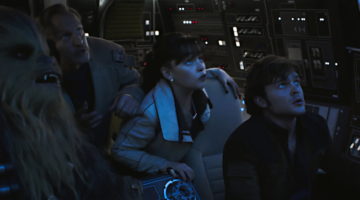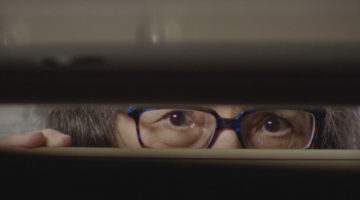Review: Steve Jobs
There is a wonderful though not particularly important moment in the third act of Steve Jobs that is too delightful to be spoiled. And while it doesn’t turn anything up on its head, it’s surely the funniest line that isn’t also incendiary or cutthroat.
It’s an utterance by the sharp-tongued Jobs (Michael Fassbender) that highlights the inherent absurdity of screenwriter Aaron Sorkin’s capricious set-up. In three acts, Sorkin puts the viewer in the moments before a trio of important technological announcements by Jobs. Each of these follows a similar pattern, though the hair styles and wardrobe surely change.
Jobs, defiant, calculative, and belligerent, seeks or is sought out by an increasingly familiar cast of characters, and each of these oft-witty, fast-paced conversations paint Jobs as a monomaniacal genius, a man with a plan but not a lot of heart.
He is visited upon by colleague and compatriot Steve Wozniak (Seth Rogen), his wife Chrisann (Katherine Waterston), his daughter Lisa, developer Andy Hertzfeld (Michael Stulhbarg), a curious journalist, and Apple CEO John Sculley (Jeff Daniels). They come in different orders, with different problems and concerns, and with his marketing executive and confidant Joanna (Kate Winslet) by his side, Jobs has more or less the same reaction. It’s a combination of smug superiority, unflinching callousness, and biting humour.
Masterfully written while smartly-paced by director Danny Boyle (that is to say, effectively erratic), Steve Jobs amalgamates the essence of a man brilliant and driven into a mesmerizing drama derived primarily from an authorized biography written by Walter Isaacson. Sorkin’s conceit, which isn’t especially accurate, so smartly creates a template from which to explore Jobs, and it barely gives the audience time to breath.
It’s less about what Jobs is offering than the why; it shows him as a man looking far into the future, unwilling to capitulate to anyone until completely proven wrong. Fassbender, among all the actors, revel in the monologues, walk and talks, and layered characters they undertake. Sorkin’s curiosity in powerful men and the relationships they have with other men (and to a lesser extent woman) takes him to a place that lacks his sometimes excessive pontification and emphasizes nuance.
It forces the viewer to be uncomfortable, ultimately. The many laughs are abbreviated; they come from shocking insults that can’t help but elicit exhortation, but the response is almost instinctual and immediately regretted. There is more than a couple exhausting confrontation, but the exemplary one is between him and Woz. It involves the question of ownership and duty. While they debate what’s more important, the details or the big picture, the past or the future, Steve Jobs scene after scene presents the viewer with another push-and-pull: do the achievements of an icon justify the sins of a man? Or more disturbing, are those successes part of the sins?
This rich, tense allegory wastes neither a word nor a beat; every scene is essentially taking place under a time limit, as the curtain is about to draw open. Steve Jobs doesn’t slowly reveal a maniac behind a man. Instead it presents both together, shows his influence and achievement, and the varying crumbling relationships Jobs has direct control of. Hoffman describes herself as Job’s ‘work wife,’ Sculley as his father, and Woz is surely his younger brother upon which he beats. Then there is his actual wife and daughter, he latter of whom he denies. So Jobs is surrounded by his family as he indefatigably looks to a shiny, bright future, which happens to now be our present that carries on without him, but is undeniably shaped by him.
[star v=45]




